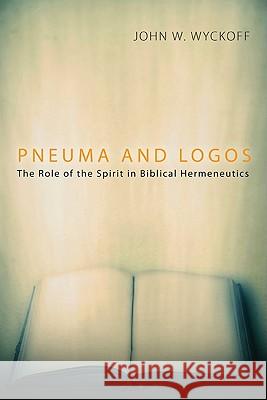Pneuma and Logos » książka
Pneuma and Logos
ISBN-13: 9781608994830 / Angielski / Miękka / 2010 / 170 str.
Pneuma and Logos
ISBN-13: 9781608994830 / Angielski / Miękka / 2010 / 170 str.
(netto: 87,12 VAT: 5%)
Najniższa cena z 30 dni: 90,97
ok. 16-18 dni roboczych
Dostawa w 2026 r.
Darmowa dostawa!
The role of the Holy Spirit in the writing of Scripture and the role of the Holy Spirit in the understanding of Scripture are corollary ideas. The first one of these--usually referred to as the Inspiration of Scripture--has been extensively discussed by the Early Church Fathers, theologians, and other Bible scholars from the earliest centuries of the Church until the present. Likewise, the second of these corollary ideas--the role of the Holy Spirit in the understanding of Scripture--has been widely considered from the time of the Early Church Fathers. However, this idea, usually referred to as the Illumination of Scripture, has not been as extensively discussed as the corollary doctrine of Inspiration. Consequently, many aspects of the Holy Spirit's relationship to Biblical Hermeneutics remain open for fruitful discussion. The notion that the Holy Spirit plays some role in the interpretative process of understanding Scripture raises many issues and questions. Does the Holy Spirit even play any role at all in the interpretative process? If so, what, then, is the role of the human interpreter in relationship to that of the Holy Spirit? Can the Holy Spirit's role be conceptualized in some meaningful way? If and when the Holy Spirit plays a role in interpretation, what difference does it make in the outcome of understanding? This book intends to further the discussion of these and other issues related to the idea of the role of the Holy Spirit in Biblical Hermeneutics. It briefly surveys both past and contemporary thought on this theme. It then suggests how the Holy Spirit's role might be conceptualized. Since this conceptualization is necessarily metaphorical, various models are presented as vehicles for furthering discourse on the subject. Finally, it attempts to describe the results of the Holy Spirit's activity of illumination and suggests areas for further study on the topic. ""In his book, Pneuma and Logos: The Role of the Spirit in Biblical Hermeneutics, John Wyckoff addresses an extraordinarily difficult question. His years of teaching and love for the Word of God shine through in this remarkably clear and concise book. Wyckoff provides historical perspective, highlights the key issues, and analyzes contemporary models. He does it all in non-technical language and with wisdom gleaned from a lifetime of teaching. The result is a book that is highly readable and stimulating. I warmly recommend it to anyone interested in serious study of the Bible."" --Robert P. Menzies author of Spirit and Power: Foundations of Pentecostal Experience John W. Wyckoff earned his PhD in Religion from Baylor University. Currently, he is Professor of Bible and Theology and Graduate Chair of Theological Studies at Southwestern Assemblies of God University in Waxahachie, Texas. He is the author of Roots of Pentecostal Belief and various articles and chapters in other works on the person and work of the Holy Spirit.
The role of the Holy Spirit in the writing of Scripture and the role of the Holy Spirit in the understanding of Scripture are corollary ideas. The first one of these--usually referred to as the Inspiration of Scripture--has been extensively discussed by the Early Church Fathers, theologians, and other Bible scholars from the earliest centuries of the Church until the present. Likewise, the second of these corollary ideas--the role of the Holy Spirit in the understanding of Scripture--has been widely considered from the time of the Early Church Fathers. However, this idea, usually referred to as the Illumination of Scripture, has not been as extensively discussed as the corollary doctrine of Inspiration. Consequently, many aspects of the Holy Spirits relationship to Biblical Hermeneutics remain open for fruitful discussion.The notion that the Holy Spirit plays some role in the interpretative process of understanding Scripture raises many issues and questions. Does the Holy Spirit even play any role at all in the interpretative process? If so, what, then, is the role of the human interpreter in relationship to that of the Holy Spirit? Can the Holy Spirits role be conceptualized in some meaningful way? If and when the Holy Spirit plays a role in interpretation, what difference does it make in the outcome of understanding?This book intends to further the discussion of these and other issues related to the idea of the role of the Holy Spirit in Biblical Hermeneutics. It briefly surveys both past and contemporary thought on this theme. It then suggests how the Holy Spirits role might be conceptualized. Since this conceptualization is necessarily metaphorical, various models are presented as vehicles for furthering discourse on the subject. Finally, it attempts to describe the results of the Holy Spirits activity of illumination and suggests areas for further study on the topic.""In his book, Pneuma and Logos: The Role of the Spirit in Biblical Hermeneutics, John Wyckoff addresses an extraordinarily difficult question. His years of teaching and love for the Word of God shine through in this remarkably clear and concise book. Wyckoff provides historical perspective, highlights the key issues, and analyzes contemporary models. He does it all in non-technical language and with wisdom gleaned from a lifetime of teaching. The result is a book that is highly readable and stimulating. I warmly recommend it to anyone interested in serious study of the Bible.""--Robert P. Menziesauthor of Spirit and Power: Foundations of Pentecostal ExperienceJohn W. Wyckoff earned his PhD in Religion from Baylor University. Currently, he is Professor of Bible and Theology and Graduate Chair of Theological Studies at Southwestern Assemblies of God University in Waxahachie, Texas. He is the author of Roots of Pentecostal Belief and various articles and chapters in other works on the person and work of the Holy Spirit.











